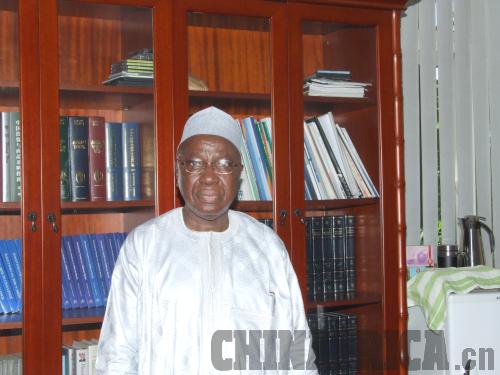| 
Aminu Bashir Wali, Nigerian Ambassador to China
In July 2013, Nigerian President Goodluck Jonathan paid a five-day state visit to China to strengthen Sino-Nigerian economic relations. In the wake of the visit, Aminu Bashir Wali, Nigerian Ambassador to China, shared his views with ChinAfrica on the two nations' bilateral relations, trade and economic cooperation, and people-to-people exchanges. Excerpts follow:
ChinAfrica: Trade turnover between China and Nigeria has almost doubled in the last five years. Do you see the rapid expansion of Chinese-Nigerian trade continuing in the foreseeable future?
Aminu Bashir Wali: Though economic activities between Nigeria and China have grown significantly in the recent past, there is an enormous capacity for growth in the amount of qualitative foreign direct investment that Nigeria can attract. The possibility for the expansion of trade between both countries is also unassailable. This is largely due to the fact that Nigeria is a huge market with about 170 million people, with early access to the whole of the West African market. Also, the emergence of the middle class and its disposable income makes it a smart destination for savvy Chinese investors.
Every year since the beginning of this decade, we have laid a beneficial path for our cooperation with China in order to make sure it brings concrete benefits to Nigerians. By concrete benefits, I mean benefits that reach to the citizenry and make their lives better. Nigeria's course in trade relations with China will see trade rise for the rest of this decade. We are confident that the recent state visit by the President of the Federal Republic of Nigeria, Goodluck Jonathan, to the People's Republic of China in July 2013 has no doubt opened an avalanche of business interests in Nigeria. The visit also ensured that economic relations between both countries are strengthened. The turnout at the Nigeria-China Business and Investment Forum held during the visit attestated to the fact that economic relations between our countries are on the right path.
The Lekki Free Trade Zone, jointly developed by east China's Jiangsu Province and Nigeria, has helped grow Nigeria's manufacturing sector, expand local employment and given Chinese companies greater access to emerging African markets. What do you think of this win-win cooperation model and can it be applied to other African countries?
As you are aware, the Nigerian Government supports the Lekki Free Trade Zone due to the mutually beneficial advantages to both Nigeria and China. Recently in Weifang, Shandong Province, there was a conference to introduce various companies in the province, to investment opportunities in Nigeria, in general, and the Lekki Free Trade Zone in particular. I am totally in agreement with people who believe that the Lekki Free Trade Zone would positively change Lagos and the lives of our people. Apart from the enormous investment and trade opportunities it has made available, that axis is witnessing huge infrastructural investment and development. This is absolutely a worthy project and it is applicable to other African countries. I am sure African countries are aware of the project and most of them will rightly replicate this in future. I should add that the more the average Nigerian benefits from the project the better, because that would be an automatic sell to all African leaders out to make a lasting difference in the lives of their people.
Nigeria is an oil rich country and China requires considerable fuel to power its steady growth. Are there steps in place to enhance any China-Nigeria cooperation in terms of this commodity?
I am sure that you are aware that there are Chinese oil interests in Nigeria, doing profitable business. Sinopec/CNOOC comes to mind. Nigeria has continued to make new investments in the oil industry and will, with time, attain greater production capacity, which will be greatly beneficial to driving our growth in particular and meeting the needs of countries, like China, that also require a lot of fuel to power their development. With the Transformation Agenda of the present administration and our efforts to break into the ranks of the most developed economies in the world, I should say that Nigeria will itself soon require an unprecedented amount of fuel to power the industries that will emerge. Our refining capacity will also be greatly enhanced in due course, in order to add value and rightfully eradicate imports of petroleum products. This makes economic sense and that will likely mean some nations will not be able to buy the amounts they wished for. However, I can assure you that as our relations with China take preeminence on the African continent, and there will be absolutely no reason why nations that are allies will not positively consider each other's needs in an effort to ensure the provision of public good to their citizenry.
While Chinese-Nigerian trade and economic relations have experienced rapid growth, how can people-to-people contacts be improved to develop cultural understanding?
We have continued to tell Nigerians that the Chinese people and culture are undoubtedly worth meeting. The Chinese, like us, are resilient, cultural and patriotic. The more contact we have [with Chinese] the easier it is to do business and bring them to Nigeria as investors and tourists. We have and will continue to do so, and also encourage the Chinese to go to Nigeria and see what a wonderful place it is. Despite the fact that we still have issues that we are grappling with, we have again risen against the odds and provided some of the finest businesspeople, medical personnel, teachers and students the world has known. Our public servants have, in key international organizations, received Chinese support and we have also rendered support to the Chinese when needed. This now has to transcend government to government contacts and the Nigerian Embassy in China and the Chinese Embassy in Nigeria have great roles to play in ensuring such contact. CA
|